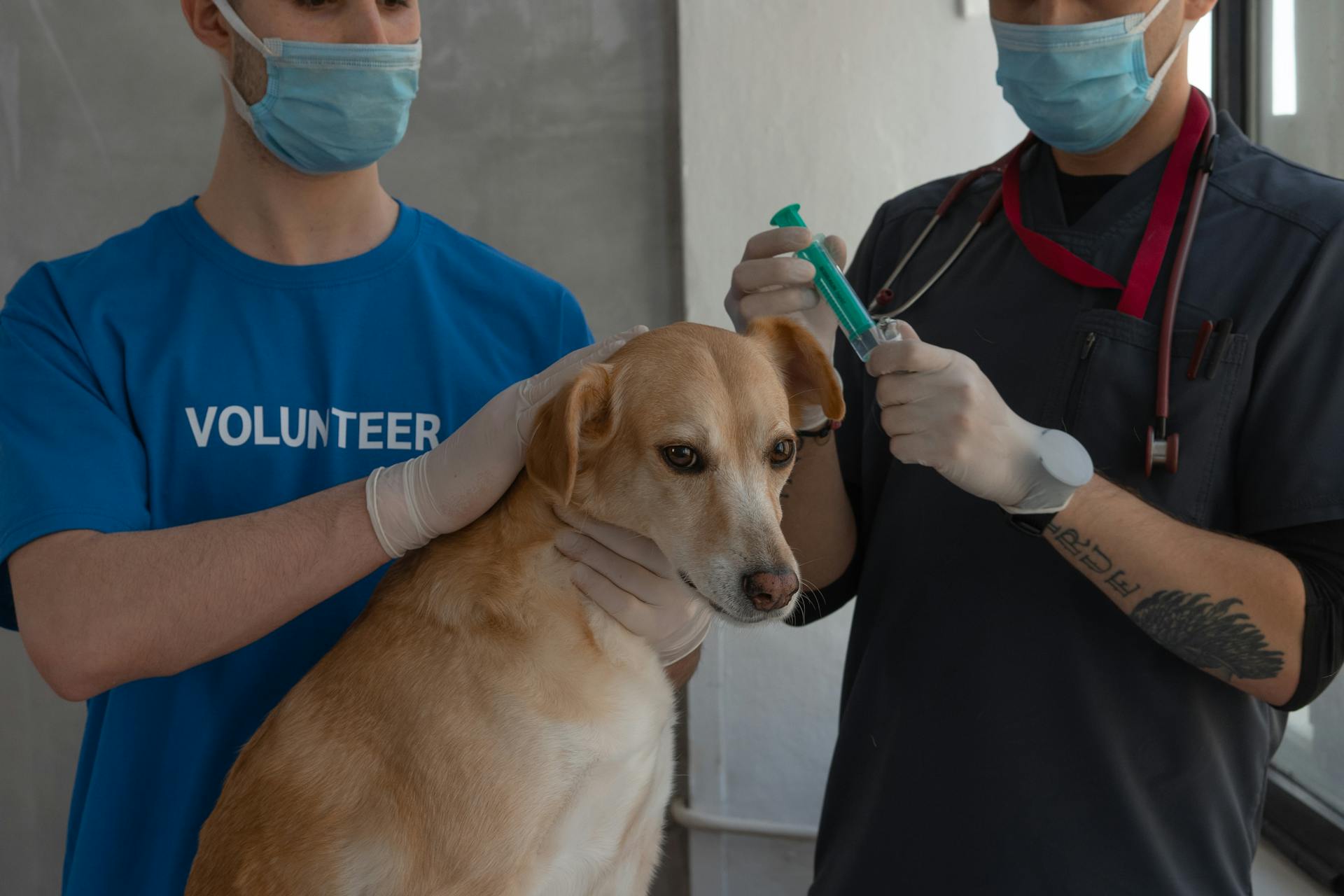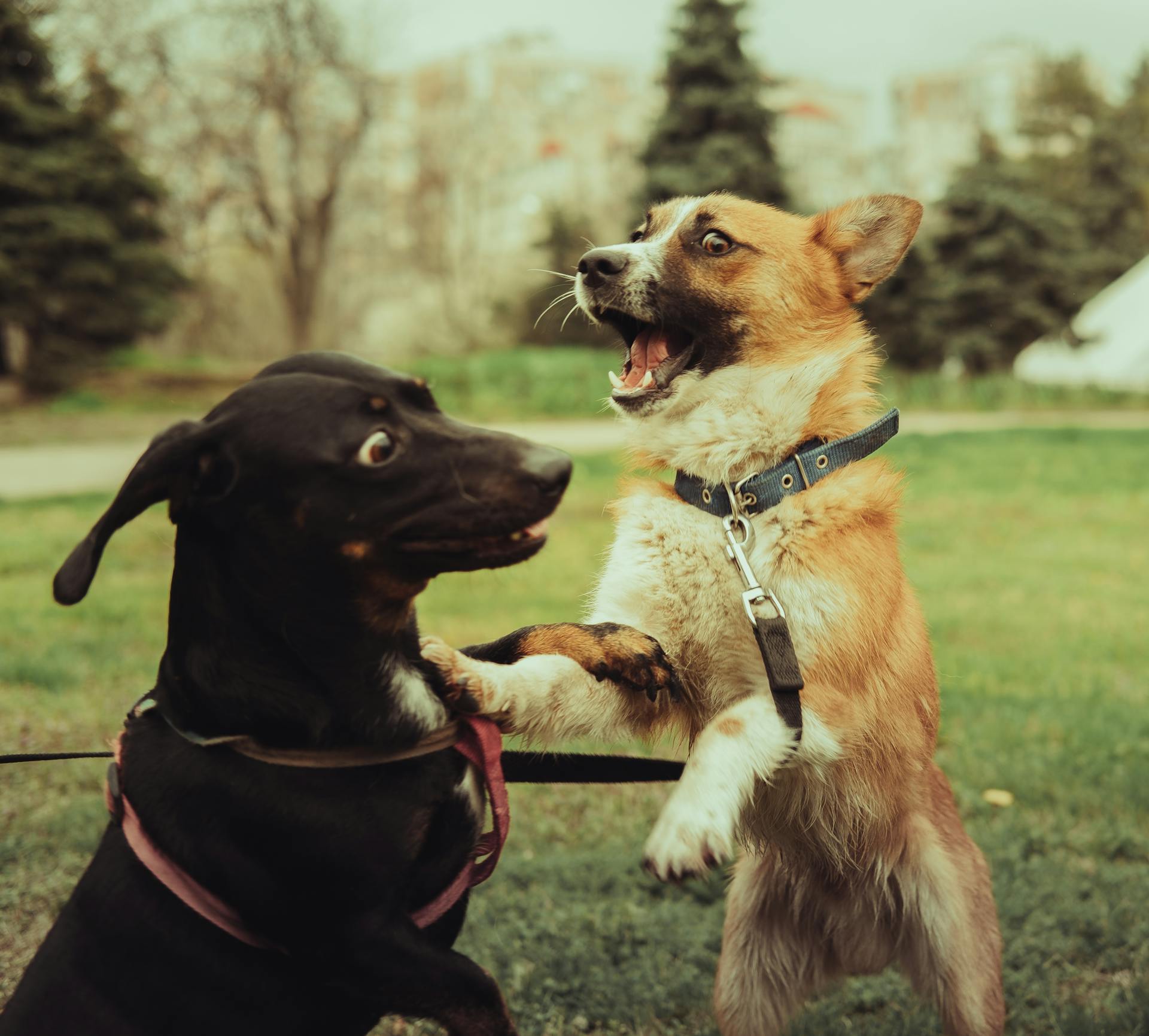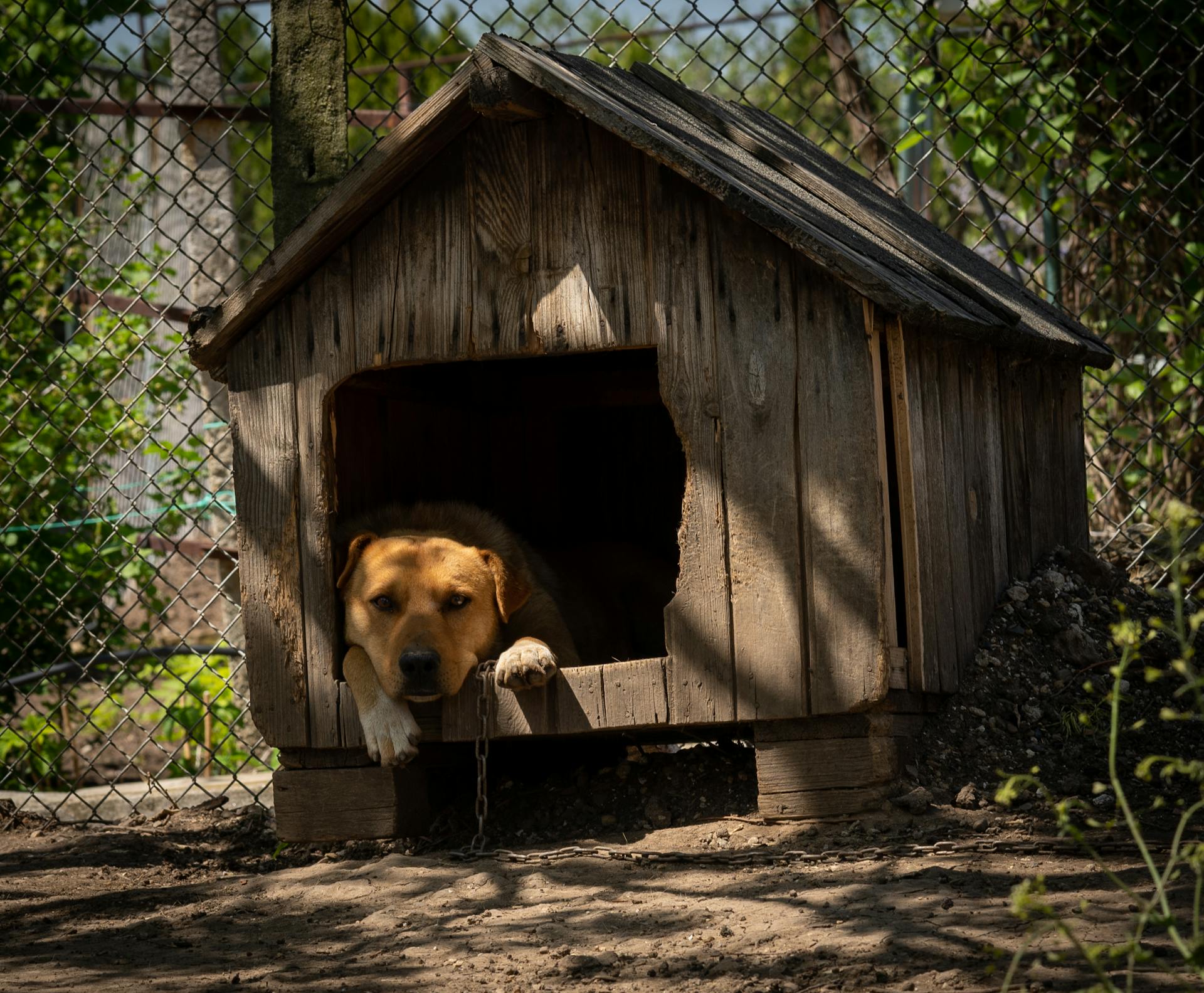
Dog diarrhea after boarding is a common issue many pet owners face. Stressed dogs are more prone to diarrhea due to changes in their environment and routine.
Dogs can pick up new bacteria and viruses while boarding, which can cause diarrhea. According to a study, up to 80% of dogs develop gastrointestinal issues while boarding.
Changes in food can also lead to diarrhea in dogs. If a dog is fed a different type of food while boarding, it can cause digestive upset. This is especially true for dogs with food sensitivities.
Stress is a major contributor to dog diarrhea after boarding. Dogs can get anxious or stressed due to separation from their owners, new surroundings, and unfamiliar dogs.
Check this out: Water Diarrhea in Dogs
Causes of Dog Diarrhea
Dogs can get sick after boarding due to various reasons.
Infectious agents like Giardia, Coccidia, intestinal parasites, and Parvovirus can cause diarrhea in dogs.
Reputable boarding places require up-to-date vaccinations and a recent negative fecal exam to reduce the risk of infectious disease.
Even with precautions, there's still a risk of your dog contracting an infectious disease while boarding.
If your dog develops diarrhea, speaking to your veterinarian about testing for these common infectious agents is a good idea.
Underlying Conditions
If your dog already has GI disease, any change to their routine can cause diarrhea. Dogs with chronic and pre-existing disease likely have a weakened immune system.
Dogs with conditions like dietary allergies, IBD, chronic pancreatitis, and intestinal lymphoma are more susceptible to diarrhea. Even one dose of missed medications can cause worsening signs.
Make sure the boarding facility continues to give your dog their regular medications, especially if they have a pre-existing condition. This can help prevent a perfect storm of diarrhea.
On a similar theme: Dog Diarrhea Medications
Stress and Anxiety
Stress and anxiety can be a major concern for dogs when they're away from home. Some dogs can get diarrhea just from stress and anxiety.
Being away from their home, routine, and family can trigger digestive upset, leading to diarrhea. This is especially common in dogs that have never been kennel trained.
The presence of other dogs, consistent barking, and the unfamiliar smells of the pet care facility can all contribute to loose stools due to stress. These new surroundings can be overwhelming for some dogs.
Curious to learn more? Check out: Almost Home Dog Boarding
Stress colitis is a common issue in dogs that experience high levels of stress and anxiety. This can be a major concern for pet owners who are considering boarding their dog.
Dogs that are prone to generalized, cage, and/or separation anxiety may not do well in a boarding facility. Even with outside playtime, the majority of the time they'll be kept in some type of kennel or cage.
Food Sensitivities
Food sensitivities can cause diarrhea in dogs, especially if they're introduced to new foods while boarding.
New foods, such as treats or soft chewy snacks, can be given to dogs at boarding facilities, and if they're not part of your dog's regular diet, they can lead to stomach upset.
Some boarding facilities will give your dog's medications in foods like peanut butter, which can also cause diarrhea.
If your dog has known or unknown dietary allergies or sensitivities, eating new foods can exacerbate their condition, causing vomiting and/or diarrhea.
Most boarding facilities will have you provide your own food and treats for your dog to decrease the risk of dietary diarrhea.
If your dog receives daily medications, be sure to provide the boarding facility with something to give your dog their medication in.
Here's an interesting read: What Food Gives Dogs Diarrhea
Underlying GI Disease
Dogs with pre-existing GI disease are more susceptible to diarrhea when their routine is disrupted. This is because their immune system is already weakened.
Dogs with dietary allergies, IBD, chronic pancreatitis, intestinal lymphoma, and other GI conditions are at higher risk. Even a small change to their diet or environment can trigger a bout of diarrhea.
Chronic and pre-existing disease can create a perfect storm for diarrhea to develop in dogs. This is especially true when they're placed in a boarding situation with other factors like stress and changes to their routine.
Dogs with chronic conditions may need to continue taking regular medications while boarding. Missing even one dose can lead to worsening symptoms.
You might enjoy: What to Bring When You Board Your Dog?
Treatment and Prevention
If your dog has diarrhea after boarding, it's essential to take action to prevent further complications. If your dog is otherwise eating and acting normally, you may not need to do anything, but if the diarrhea persists for more than 48 hours, contact your regular veterinarian.
Your vet may prescribe medications to help decrease intestinal inflammation, which often causes diarrhea. Some common anti-diarrheal agents include Metronidazole and Tylosin. Dewormers like Panacur, Dolpac, and Drontal may also be prescribed if your dog has a parasitic infection.
To soothe your dog's upset tummy, try a bland diet for 24 to 48 hours, consisting of plain-cooked white rice with a little chicken and some canned plain pumpkin. You can also offer natural yogurt, probiotics, peeled boiled potatoes, cottage cheese, and egg with no oil added.
If your dog is vomiting or has a lack of appetite, your vet may recommend anti-nausea medication. Stomach protectants and antacids can also help with stomach irritation and irritation of the upper digestive tract.
To prevent dog diarrhea, consider the following natural solutions: white or brown rice, rice water, yogurt, canned pumpkin, cottage cheese, boiled potatoes (without skin), chicken (without skin), eggs, and certain herbs like fennel.
Here are some foods that can help dogs with diarrhea:
- White or brown rice
- Rice water
- Yogurt
- Canned pumpkin
- Cottage cheese
- Boiled potatoes (without skin)
- Chicken (without skin)
- Eggs
- Certain herbs like fennel
Some manufacturers also offer specially-formulated dog foods that can alleviate stomach issues. You might need to obtain them from your veterinarian.
When to Seek Help
If your dog has had a single episode of diarrhea but is otherwise acting normal, it's likely not a cause for concern. However, if you notice more than two episodes, it's a good idea to contact your vet.
If your dog is straining to pass a stool but only passing small amounts of watery diarrhea, it could be a sign of a painful blockage, and you should seek veterinary attention right away.
If your dog is experiencing recurring bouts of diarrhea over a short period of time, especially if they're old, young, or have a compromised immune system, it could be a sign of a serious health issue like parvovirus.
Dogs showing other symptoms like lack of appetite, blood in stool, signs of dehydration, unusual drooling, weakness, or vomiting should be seen by a vet as soon as possible.
Here are some situations that require immediate veterinary attention:
- Diarrhea lasts for more than three days;
- Other clinical signs like vomiting, lethargy, weakness, fever, dry or pale gums;
- Using medications like antibiotics;
- Old age or certain conditions like diabetes, cancer, or Cushing’s disease.
Understanding Diarrhea
Diarrhea is a common issue in dogs, especially after boarding, where their routine is disrupted and they may be exposed to new bacteria.
The main cause of diarrhea in dogs is the presence of bacteria, viruses, or parasites in the digestive system, which can be introduced through contaminated food, water, or contact with other animals.
A sudden change in diet can also trigger diarrhea, as seen in the case of a dog that developed diarrhea after being fed a new type of food while boarding.
The symptoms of diarrhea in dogs include loose, watery stools, abdominal pain, and frequent bowel movements.
A dog's digestive system can take 24 to 48 hours to recover from a bout of diarrhea, depending on the severity of the issue.
Additional reading: Food for Diarrhea in Dogs
Puppies
Diarrhea in puppies can be a sign of a serious health condition, so it's essential to keep a close eye on them.
If your puppy's stool contains blood, smells foul, is black and tarry, or if the diarrhea is accompanied by sickness, pain, loss of appetite, and/or fever, get in touch with your vet immediately.
Puppies with diarrhea need regular monitoring to prevent dehydration.
If your puppy has diarrhea, it's crucial to get in touch with your vet, especially if the symptoms persist or worsen over time.
What Is Dog Diarrhea
Dog diarrhea is a common issue that can be caused by a variety of factors, including eating spoiled or toxic food.
Dogs can be particularly prone to diarrhea due to their diet, which often consists of high-protein foods that can be difficult for their digestive systems to process.
A sudden change in a dog's diet can lead to diarrhea, as their gut microbiome takes time to adjust to new ingredients.
Some common symptoms of dog diarrhea include loose, watery stools, abdominal pain, and vomiting.
In severe cases, dog diarrhea can lead to dehydration and electrolyte imbalances, which can be life-threatening if left untreated.
If you suspect your dog has diarrhea, it's essential to monitor their stool quality and watch for signs of dehydration, such as excessive thirst, dark urine, or lethargy.
Types of Diarrhea
Diarrhea in dogs can be acute or chronic. Acute diarrhea often resolves on its own, but you should see a vet if it has lasted for more than 48 hours.
There are two main categories of canine diarrhea: small-bowel and large-bowel diarrhea. Small-bowel diarrhea arises from the small intestine and is characterized by frothy and fatty stools.
Large-bowel diarrhea, on the other hand, arises from the colon or large intestine and is characterized by small volumes of stool at an increased frequency.
Here are the key differences between small-bowel and large-bowel diarrhea:
If your dog is experiencing chronic diarrhea, it's essential to identify the underlying cause, which can include parasites, inflammatory bowel disease, cancer, or a diet sensitivity.
Frequently Asked Questions
How long does stress diarrhea last in dogs?
Most dogs recover from stress colitis within 3-5 days, but chronic or severe cases may require further testing and treatment. If your dog's diarrhea persists, consult a veterinarian for proper diagnosis and care.
Sources
- https://www.hepper.com/why-does-my-dog-have-diarrhea-after-returning-from-boarding-vet-answer/
- https://www.fallsroad.com/site/tips-resources-blog-baltimore-vet/2021/10/12/diarrhea-dogs
- https://www.pawlicy.com/blog/diarrhea-in-dogs/
- https://bondvet.com/b/dog-diarrhea-causes-and-treatment
- https://mayapet.com/blogs/blog/dog-diarrhea-boarding-causes-solutions
Featured Images: pexels.com


